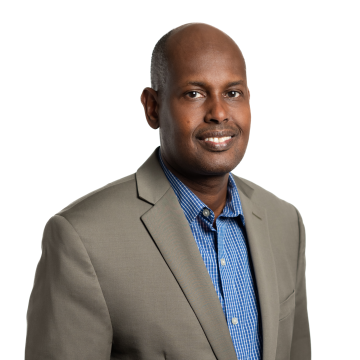Muhidin Warfa
2025 Bush Fellow

Executive director of multilingual programs | Trilingual advocate | Advocate for language equity
in schools
Muhidin Warfa believes that honoring and expanding linguistic and cultural identities is key to transforming education. As the Executive Director of Multilingual and Magnet Programs for Minneapolis Public Schools, he has led major structural reforms, from building heritage language programs in Somali and Hmong to expanding dual-language options and working with community leaders to advocate for the state’s first licensure pathways for community languages.
Muhidin is trilingual in Somali, Swahili and English. His journey from a librarian to a district leader has given him a deep understanding of systemic inequities and the tools to challenge them. Muhidin has championed policy, programming and staffing changes that elevate the assets of multilingual learners and families. Others know him as a steady presence who elevates student voices, while navigating complex political systems with grace. Not one to tell people what they want to hear, Muhidin builds trust through authenticity. He is widely respected at the national level for his work expanding access to programs that reward students for proficiency in languages other than English. He has also led efforts to expand access to dual-language and heritage programs.
With the Bush Fellowship, he seeks to pursue an administrative licensure, deepen community-rooted approaches to language learning and explore African traditional education models that honor oral traditions and mentorship.
What experiences most shaped your approach to language, leadership, and education?
My early years in Somalia and later Kenya exposed me to multiple languages and distinct ways of learning—both formal British-style education and learning from the elders in my family and community. That taught me how language provides access not just to information, but to people. I know what it’s like to have my name mispronounced, to be judged for my accent and to feel unseen. But I’ve used those experiences to lead with empathy and connection. I’ve learned what can be taught in a classroom, and what must be learned through human relationships.
What change do you want to make—and what new ideas are you excited to explore?
We need to break language learning out of the factory model of education. Despite our multilingual community, too many language programs are inaccessible or quickly gentrified. I want to explore ideas like Saturday schools, early language immersion “nests” for young children and technology-fueled, student-driven learning. I also want to understand African Traditional Education systems, which center oral traditions, mentorship and cultural practice.